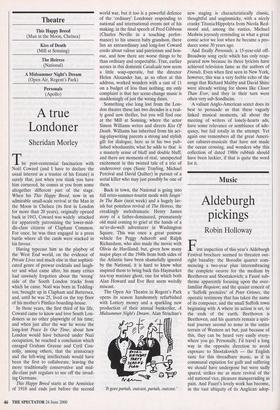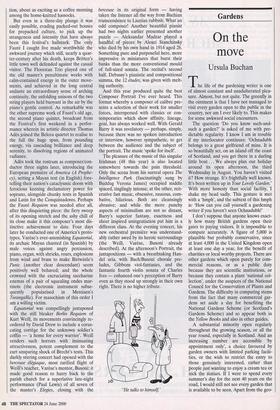Music
Aldeburgh pickings
Robin Holloway
First inspection of this year's Aldeburgh Festival brochure seemed to threaten out- right banality: the Borodin quartet com- mencing a two-year plan interembracing the complete oeuvre for the medium by Beethoven and Shostakovich; a Faure sub- theme apparently focusing upon the over- familiar Requiem; and the quaint conceit of a 'Suffolk premiere' of Peter Grimes, the operatic testimony that has taken the name of its composer, and the small Suffolk town beginning with A where its action is set, to the ends of the earth. Beethoven is Beethoven, and his quartets remain a spiri- tual journey second to none in the entire terrain of Western art but, just because of this, they can be heard very easily every- where you go. Personally, I'd travel a long way in the opposite direction to avoid exposure to Shostakovich — the English taste for this threadbare music, as if in communal expiation for guilt and suffering we should have undergone but were sadly spared, strikes me as mere revival of the old national vice, pleasure masquerading as pain. And Faure's lovely work has become, in the vast ubiquity of its Anglican adop- tion, about as exciting as a coffee morning among the home-knitted hassocks.
But even in a three-day plunge it was easily possible, evading packed-out houses for prepacked culture, to pick up the strangeness and intensity that have always been this festival's hallmark. The only Faure I caught live made worthwhile the awkward journey which still, nearly a quar- ter-century after his death, keeps Britten's little town well defended against the casual visitor. The Florestan Trio played one of the old master's penultimate works with calm-contained energy in the outer move- ments, and achieved in the long central andante an extraordinary sense of arching continuity, the unfolding unisons of the two string players held buoyant in the air by the piano's gentle control. As remarkable was the other supreme work of Faure's old age, the second piano quintet, broadcast from the Festival's first weekend in a perfor- mance wherein its artistic director Thomas Ades joined the Belcea quartet to realise to the full the huge span, from pounding energy, via cascading brilliance and deep serenity, to dissolving regions of animated radiance.
Ades took the rostrum as composer/con- ductor three nights later, introducing the European premiere of America (A Prophe- cy), setting a Mayan text (in English) fore- telling their nation's cataclysmic doom with ferocious keening declamatory power for soprano, alongside chunky texts in Spanish and Latin for the Conquistadores. Perhaps the Faure Requiem was needed after all, after this disquieting piece: the fiery sweep of its opening stretch and the ashy chill of its close make it this composer's most dis- tinctive achievement to date. Four days later he conducted one of America's proto- types, Varese's ever-astonishing Equatorial, its archaic Mayan chanted (in Spanish) by male voices against angry percussion, piano, organ, with shrieks, roars, explosions from wind and brass to make Birtwistle's Panic (another clear descendant) seem positively well behaved;, and the whole crowned with the excruciating saccharine enemas of a pair of squealing ondes mar- tinots (the electronic instrument subse- quently popularised in Messiaen's Turangalila). For masochism of this order I am a willing victim.
Equatorial was compellingly juxtaposed with the still bleaker Berlin Requiem of Kurt Weill, its movements convincingly re- ordered by David Drew to include a corus- cating cortege for the unknown soldier's coffin — 'a home for every warrior'. Weill renders such horrors with insinuating attractiveness, potent complement to the curt unsparing shock of Brecht's texts. This darkly stirring concert had opened with the berceuse elegiaque, most rarified flight of Weill's teacher, Varese's mentor, Busoni: it made good reason to hurry back to the parish church for a superlative late-night performance (Paul Lewis) of all seven of the master's Elegies, closing with the berceuse in its original form — having taken the listener all the way from Bachian transcendence to Lisztian rubbish. What an odd composer! Another beautiful pianist had two nights earlier presented another puzzle — Aleksandar Madzar played a handful of pieces by Alexei Stanchinsky who died by his own hand in 1914 aged 26. Something pure and purposeful here, more impressive in miniatures that burst their banks than the more conventional mould of full-sized sonata. The recital's second half, Debussy's pianistic and compositional summa, the 12 etudes, was given with melt- ing authority.
And this year produced quite the best Composer Portrait I've ever heard. This format whereby a composer of calibre pre- sents a selection of their work for smaller forces, interspersed with classics or con- temporaries which show affinity, lineage, goal, has always worked well. With Gerald Barry it was revelatory — perhaps, simply, because there was no spoken introduction or interview, however sympathetic, to get between the audience and the subject of the portrait. The music 'spoke for itself.
The pleasure of the music of this singular Irishman (48 this year) is also located somewhere towards the pain threshold. Only the scena from his surreal opera The Intelligence Park (fascinatingly sung by Buddug Verona James) occupied middle spaced, tinglingly intense; at the other, reit- erative fast music, obsessive, raucous, com- bative, hilarious. Both are cleansingly abrasive; and while the more punchy aspects of minimalism are not so distant, Barry's superior fantasy, exactness and sheer inspired uningratiation put him in a different class. At the evening concert, his new orchestral premiere was understand- ably rather awed by its heroic surroundings (the Weill, Varese, Busoni already described). At the afternoon's Portrait, the juxtapositions — with a breathtaking Han- del aria, with BachiBusoni chorale pre- ludes, Gibbons viol-fantasies, and the fantastic fourth violin sonata of Charles Ives — enhanced one's perception of Barry even as they stood up strongly in their own right. There is no higher tribute.
"He talks to himself'



































































 Previous page
Previous page